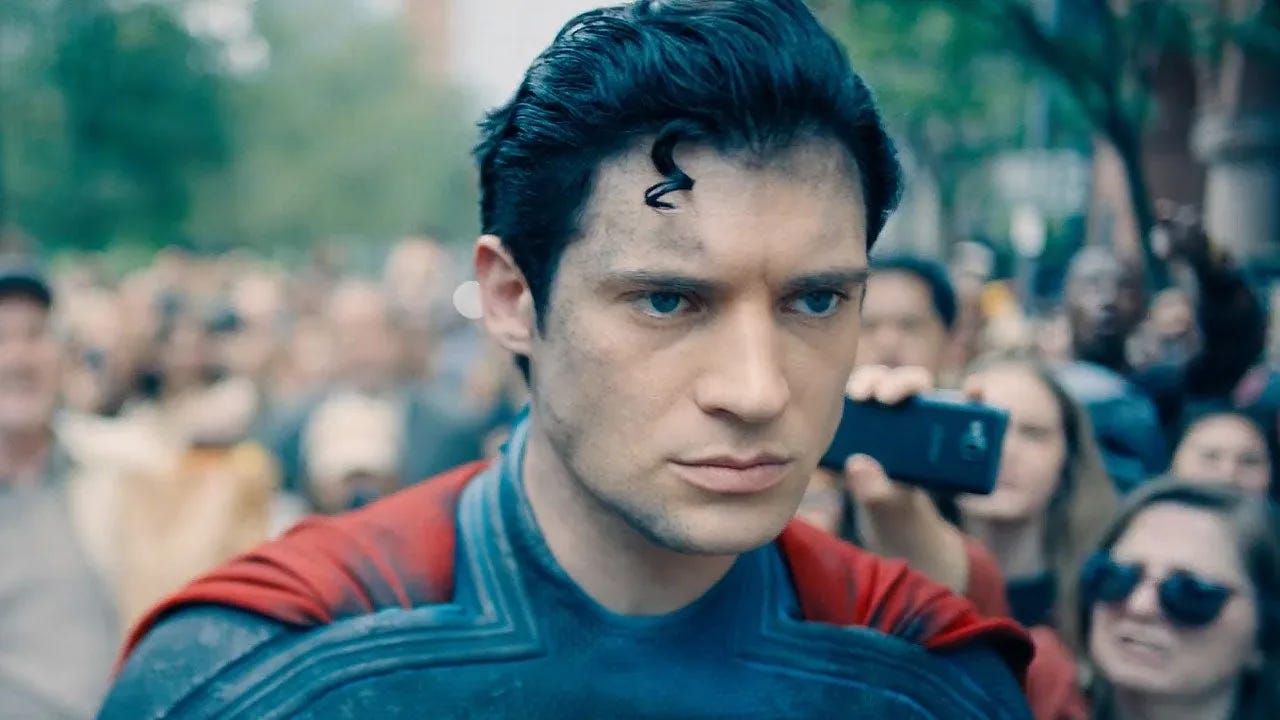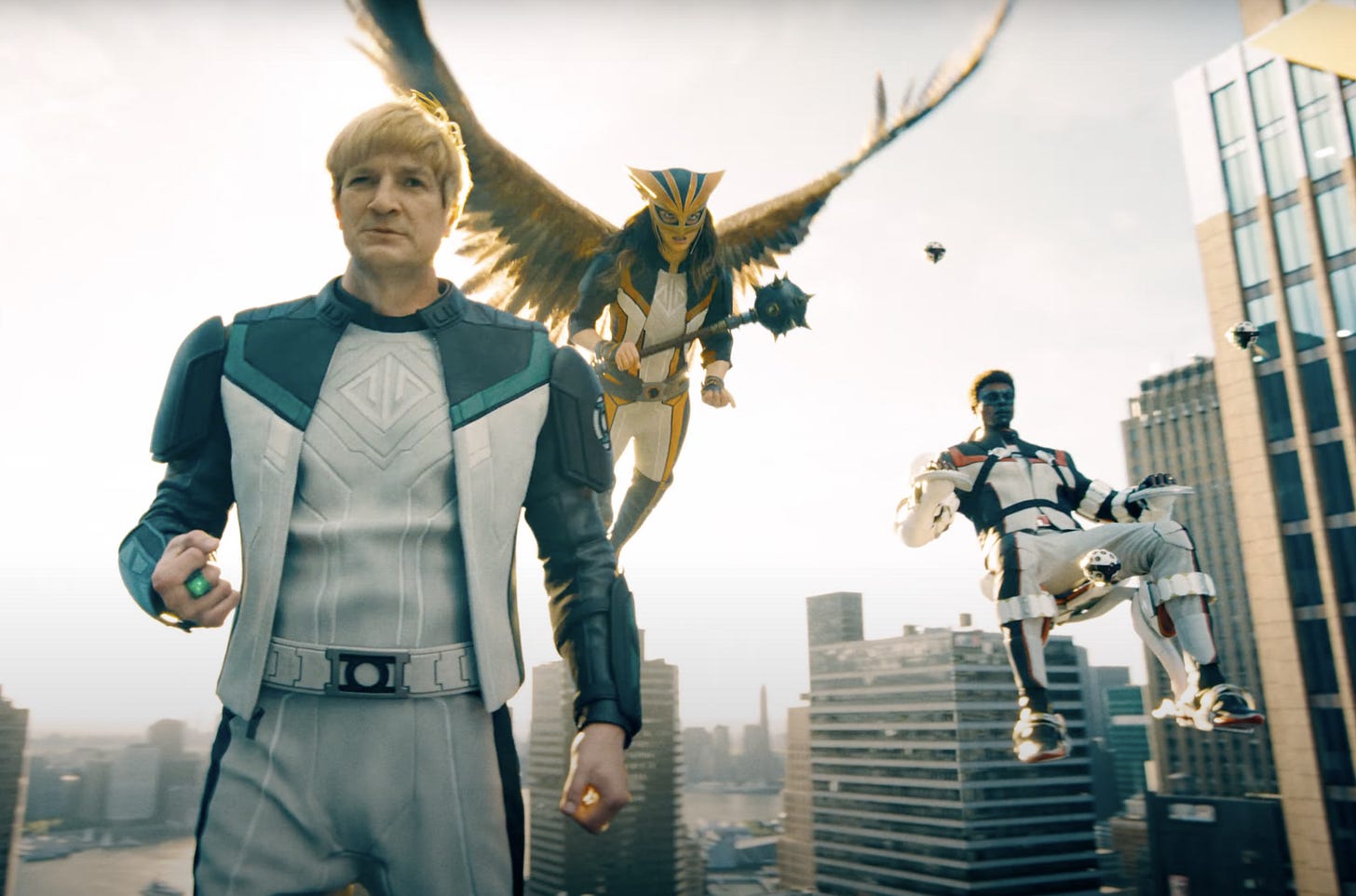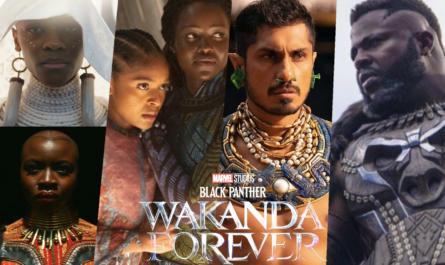“Superman” (2025), written and directed by James Gunn, reboots the DC Universe with David Corenswet as Clark Kent, Rachel Brosnahan as Lois Lane, and Nicholas Hoult as Lex Luthor. The movie begins three years into Superman’s career, as he struggles to define his role in a politically tense world where nations like Boravia and Jarhanpur tiptoe on the edge of war. When Superman intervenes to stop a foreign invasion, he’s celebrated as a savior but condemned as an unregulated power, leading to global controversy. Lex Luthor exploits this tension, releasing a disinformation campaign and creating a clone known as Ultraman to turn humanity against Superman. Framed, Superman is captured and imprisoned in an alternate dimension, where he confronts isolation, doubt, and memories of his Kryptonian and human parents. With the help of Lois Lane, Mister Terrific, and his loyal dog Krypto, he escapes. Then Superman defeats Ultraman by sacrificing him into a rift, sealing it before it swallows the city. Lois exposes Luthor’s manipulation and restores Superman’s honor while Lex Luthor gets arrested. The ending sees Clark reconciling his dual identity, embracing both his humanity and Kryptonian heritage. The movie ends by portraying Superman not as a godlike figure but as a moral compass in an uncertain world, a symbol of truth, compassion, and hope.
Superman’s Personality
Clark Kent has always been modest and calm. If I had to describe his personality, I would say he is calculated, observant, and reflexive. Due to how he analyzes people and the situation before acting, his solutions are successful and wise. However, some people disliked this recent Superman reboot. I dare say most viewers enjoyed the movie, considering it made $614 million worldwide. Some audiences have judged the recent Superman movie as “too woke” with a “too soft Superman”. But too soft, how?
In the 1978 movie with Christopher Reed and Margot Kidder, Superman was also tender and very respectful. There is a scene in which Lois interviews Superman, and they are on her apartment’s balcony. They are both into each other, and Superman keeps answering Lois’s questions carefully and patiently, as they slightly flirt with each other. The biggest difference in that interview scene from 1978 and the one from 2025 is that James Gunn’s Superman is more impatient with Lois’s questions, as they are more intrusive and challenging. They are also in a relationship by then.
In James Gunn’s adaptation, Superman is very kind. He is keen on empathy and wants to save and help everyone. He believes every person deserves to be saved and protected, but at the same time, he is fighting Lex Luthor and his accusations. The key difference with this Superman is how he’s getting beaten by Lex Luthor’s ingenious strategies, such as anticipating his every move with advanced technology, and weaponizing other superhumans against him, like Mr. Element.
Talking to some friends, they thought this Superman was “too soft” and “woke” because, according to them, this Superman was easily beaten and too distracted by trying to save everyone and being “too good” that he got easily caught by Lex Luthor. They also judged his response to Lex Luthor’s accusations. My friends mentioned he should have defended himself, but instead, he lowered his head and hid away in the Fortress of Solitude. We must remember this adaptation of Superman was also judged as “woke” by some people in the media, because James Gunn called Superman an immigrant. But, James Gunn’s quote goes beyond mere immigration; he said:
“I think people took something I said…The guy for the London newspaper. Originally, he said that [Superman comic creators] Jerry Siegel and Joe Shuster were the sons of immigrants, and they wrote Superman as an immigrant story. And I said, yeah, it’s a story about an immigrant, but mostly it’s a story to me about kindness, which it is. That’s the center of the movie for me. (Gunn on The Guardian, 2025)”
As James Gunn said, it’s mainly a story about kindness. That is why this latest Superman is slightly more empathetic and caring than the other adaptations. However, he didn’t deviate from the original story. Superman IS and has always been kind, supportive, agreeable, and tender. He empathizes with people’s struggles, and it makes perfect sense because he is also a man who has suffered. People who have suffered and experienced loss and loneliness tend to be more empathetic and caring because they wouldn’t wish that upon anyone. Not only would they not wish it on anyone, but they would also help others prevent going through the same painful experiences they faced. Superman is an individual who lost his parents, his planet, everything known that would explain his identity and powers, yet he overcame such pain and put it to work to help others instead of growing resentful and becoming evil.
So… what exactly is “too woke” about this Superman? He’s always been like that. Maybe other actors put on a tougher facial expression, but essentially, the personality is the same. I think this argument, whether Superman is “too soft” or “too woke”, is nothing but a reflection of our times. People start fights over meaningless arguments. Those who started complaining about the movies were Fox News, calling it “Super Woke”. This type of speech is encouraged by Fox News because they want to keep differentiating themselves from their competition; they are rage-baiting their viewers into hating people with liberal views or who are their competition. They are also doing it to increase their ratings and views; perhaps they even lie to themselves, deep down, they don’t even fully believe Superman is “SuperWoke” or, even, problematic. This type of media outlet needs to create a problem to start providing possible solutions to their viewers.

DC Films. The Safran Company. Peter Safran. Troll Court Entertainment. 2025.
Why is Extra Care or Empathy Considered Wrong?
To add to what I previously said. We currently live in mini “cultural wars” in which either liberal or conservative groups and media outlets loudly fight about small debates that no one thought of, but them. For example, creating an online debate on whether Superman is an example of Hollywood’s and our modern times’ “irrational” profile. However, this is just a symptom of how cultural institutions, including the government, have fueled polarization amongst the population.
For example, narrowing down what “progression” or “wokeness” is, as well as narrowing down what “problematic” or “hateful speech” is. Both sides tend to sensationalize cultural phenomena, whilst ignoring nuance. Another example is Donald Trump saying, “Wokeness is trouble. Wokeness is bad. (Trump on DW, 2025)”. This ideal has become so problematic that the push back against progression has become worse than Fox News calling a normal empathetic man “SuperWoke”, but rather to harmful lengths, such as Trump defunding Diversity, Equity, and Inclusion Programs. Another example of a cultural shift taken out of proportion is Susanne Shröter’s book “The New Culture War. How a Woke Left Threatens Science, Culture and Society”, calling wokeness “Ideological Terror”.
On the other hand, there are woke people who exaggerate things, calling them “politically incorrect” or “hate speech” when they haven’t reached that length either. For example, some people call themselves “woke” and fall under performative activism online, pointing fingers at other people, when they do nothing but show their anger online. These people, although an exception amongst liberals and progressives, tend to fall into these behaviors because they want to feel better or superior to others. Instead of involving themselves with local activist groups and informing themselves, considering the nuances, they mainly want to moralize and patronize those who think differently, but have no hateful ideas. Another example of a lack of nuance and listening is when, in the summer of 2022, Vincent Lloyd, a respected Black scholar of political theology and race studies, was invited to lead a six-week course for the Telluride Association: “Race and the Limits of Law in America.” After several weeks, tensions grew. Two students were expelled by vote for perceived ideological failings, and eventually Lloyd himself was accused of perpetuating “anti-Black violence.” In the final class, each student read a prepared statement condemning both Lloyd and the seminar. They accused him of committing microaggressions, using harmful body language, and failing to correct peers who didn’t frame anti-Blackness as the source of all global injustice. They said they didn’t feel safe in his classroom. In the end, Lloyd argues the conflict was not mainly about content but about form. He was conducting a seminar, where participants engaged with texts and exchanged ideas through open debate and questioning. The students, however, treated the space as a workshop, where a fixed moral dogma must have been affirmed.
In other words, if we didn’t live in such polarized times where everyone tries to moralize anyone, lacking nuance and critical thinking, we wouldn’t see audiences discussing whether this movie is “too progressive”. I think there were times in which people watched movies to enjoy them and question things they hadn’t thought of, but now audiences have become more demanding. They already have a recipe in their head for what they wish to watch, and that isn’t fully wrong. It’s rather something that we should balance out and try to understand and listen to the ideas proposed before jumping to a conclusion too early and labeling movies with descriptions that don’t apply or were taken out of context. For example, James Gunn’s comments about Superman being an immigrant were blown out of proportion to push a certain agenda that doesn’t correlate to the movie’s actual message.

DC Films. The Safran Company. Peter Safran. Troll Court Entertainment. 2025.
Collectivist vs Individualist Mindset
There is another factor I consider a cause of why some people dislike the movie: the individualist vs. collectivist mindset. People in the West tend to be more individualistic, whereas people from some Asian countries, like India, Japan, or China, tend to be more collectivistic. According to David Robson’s article “How East and West think in profoundly different ways”, Western societies value personal success more than group success. This leads to the search and need for greater self-esteem and personal happiness. This also results in a tendency for self-inflation, and in some cases, when Americans were told to draw themselves, they would draw themselves bigger than the rest of the people in the drawing. In a study by Richard Nisbett at the University of Michigan, people from East Asia spent more time observing the background of an image, trying to understand the context. On the other hand, Americans concentrated on the protagonist of the picture. This dynamic affects more than drawings or more than personal perception; it influences how people understand the world and themselves and those around them within such a world.
People in collectivist societies are inclined to more holistic approaches for conflict resolution, but people in individualistic societies focus on individual elements, considering a situation as something harder to change or fixed. As a character, Superman has always been kind and resourceful. He has always been keen on the greater good and the betterment of planet Earth, even if he is from Krypton. However, James Gunn’s 2025 Superman is more collectivistic than individualistic. He thinks about the best for most people, and although he is alone and no one has the same power as him, he focuses on team building. That is why he approaches Lois, Michael Holt, Green Lantern, Hawk Girl, and even persuades Mr. Element to join the fight against Lex Luthor’s abuse and authoritarianism. This dynamic is also what frees Jarhanpur from Boravia.
Although the character’s personality didn’t change, the presentation about him did. Other movies portrayed Superman as the “one and only”, “the man, the myth, the legend” archetype who doesn’t need help from anyone because he is individually successful and supreme. Whereas James Gunn’s portrayal of the same character takes his kindness and delves into how “teamwork makes the dream work”. It leads to one of the most important questions Superman asks: “What makes us human?”. In the end, kindness and empathy make us human, but what if such values aren’t shared? Can we truly achieve success and kindness in search for the betterment of the world if we don’t work collaboratively? I believe the answer is no. But in the West, most people like to believe otherwise. Perhaps, people are uncomfortable because they didn’t see the individualistic, self-centered presentation of their favorite hero. Maybe people wanted to feel motivated after looking at an unstoppable and undefeatable Superman who doesn’t need anyone to win or save the world. However, just like Superman needed help from other heroes to improve the world, beat Lex Luthor, and free Jarhanpur, we all need help. We thrive through collaboration and group support. This idea challenges an established paradigm on what it means to be successful or powerful. But that is the point about art, right? It’s about challenging audiences and pushing them into questioning their own dogmas.

DC Films. The Safran Company. Peter Safran. Troll Court Entertainment. 2025.
Hirota, S., Nakashima, K. & Tsutsui, Y. Psychological motivations for collectivist behavior: comparison between Japan and the U.S. Mind Soc 22, 103–128 (2023). https://doi.org/10.1007/s11299-023-00298-y
Robson, D. (2017). How East and West think in profoundly different ways. BBC Future. https://www.bbc.com/future/article/20170118-how-east-and-west-think-in-profoundly-different-ways
Pulver, A. (2025). Superman is super woke? How politics play into the new man of steel. The Guardian. https://www.theguardian.com/film/2025/jul/12/superman-movie-woke-politics-immigration
Žižek. (2023). Wokeness is here to stay. Compact Magazine. https://www.compactmag.com/article/wokeness-is-here-to-stay/
(2025). The culture war on wokeness from the US to Germany. DW. https://www.dw.com/en/the-culture-war-on-wokeness-from-the-us-to-germany/a-71892359





